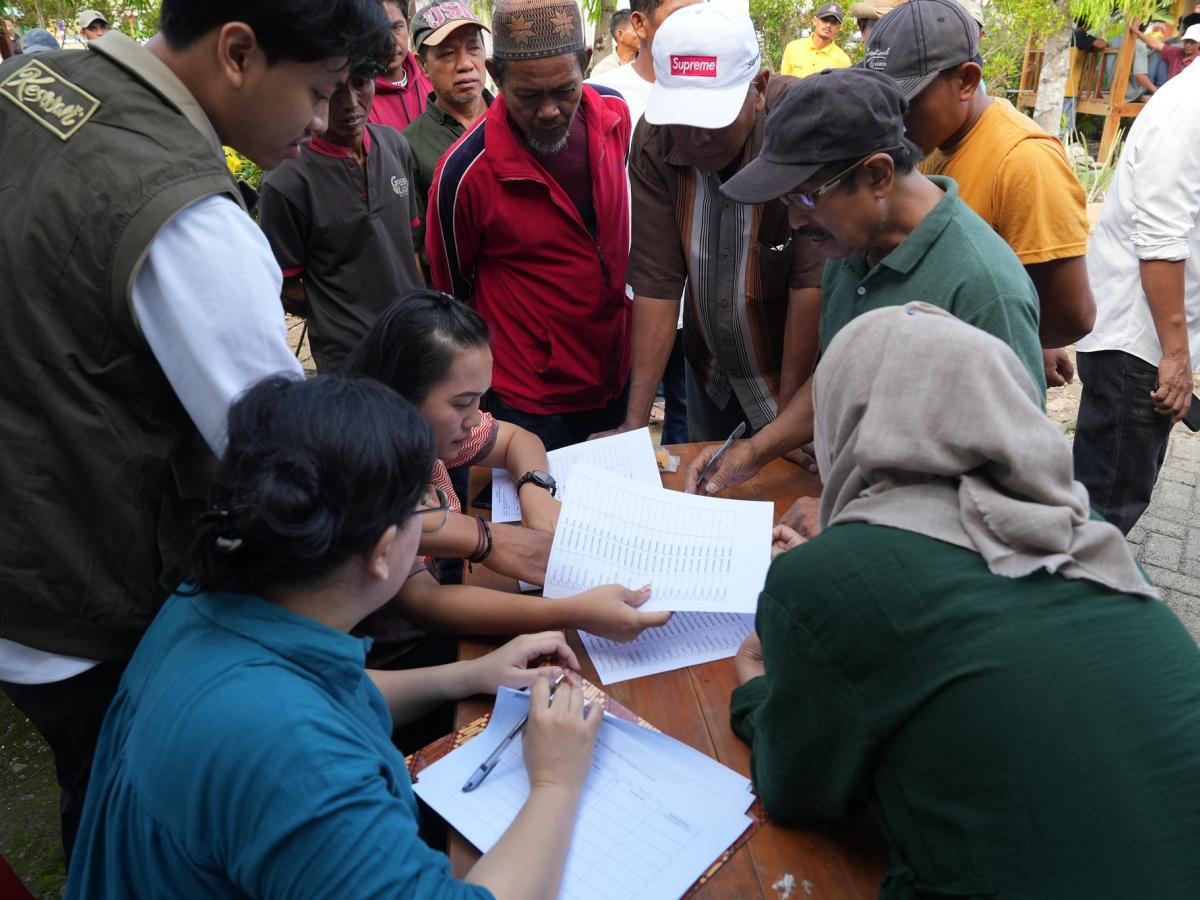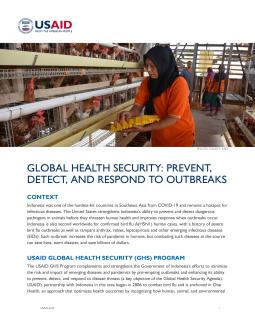Context
Indonesia was one of the hardest-hit countries in Southeast Asia from COVID-19 and remains a hotspot for infectious diseases. The United States strengthens Indonesia’s ability to prevent and detect dangerous pathogens in animals before they threaten human health and improves response when outbreaks occur. Indonesia is also second worldwide for confirmed bird flu A(H5N1) human cases, with a history of severe bird flu outbreaks as well as rampant anthrax, rabies, leptospirosis and other emerging infectious diseases (EIDs). Each outbreak increases the risk of pandemic in humans, but combating such diseases at the source can save lives, avert disaster, and save billions of dollars.
USAID Global Health Security (GHS) Program
The USAID GHS Program complements and strengthens the Government of Indonesia’s efforts to minimize the risk and impact of emerging diseases and pandemics by pre-empting outbreaks and enhancing its ability to prevent, detect, and respond to disease threats (a key objective of the Global Health Security Agenda). USAID’s partnership with Indonesia in this area began in 2006 to combat bird flu and is anchored in One Health, an approach that optimizes health outcomes by recognizing how human, animal, and environmental health intertwine and overlap. USAID GHS supports programs, policies, and systems that enable better communication and information exchange among these three sectors. Areas of specific focus include zoonoses, surveillance systems, laboratories and diagnostics, risk communications, and human resources for One Health.
The USAID GHS portfolio supports the Government of Indonesia’s priorities and programs and is carried out through the following:
USAID-FAO Global Health Security Program (USAID FAO GHSP)
USAID and the Food and Agriculture Organization of the United Nations (FAO) are partnering to support programs, policies, and systems that enable better communication and information exchange among the human, animal, and environmental sectors. Areas of specific focus include zoonosis prevention and response, surveillance systems, laboratories and diagnostics, risk communications, and human resources for One Health.
USAID and the FAO prioritize the enhancement of laboratory capacity for testing and diagnostics at animal health Disease Investigation Centers to detect and prevent zoonotic diseases and EIDs. The activity also provides support to the national and sub-national Offices of Animal Husbandry and Health to raise awareness among veterinary practitioners about responsible farming and antibiotic use.
Results: Strengthened the national influenza virus monitoring platform for early detection and monitoring of new avian influenza strains; fostered multisectoral collaboration for integrated surveillance of zoonoses and EIDs involving the public health, animal health, and wildlife/environment sectors, as well as antimicrobial resistance control, with best practices showcased at international forums such as the G20 and ASEAN; and developed the National Poultry Health Improvement Program and a coordination forum with the GOI and the private sector as part of a public-private partnership.
USAID-WHO Global Health Security (USAID WHO GHS)
USAID and the World Health Organization (WHO) are partnering to strengthen Indonesia’s ability to prevent and detect dangerous pathogens in animals before they threaten human health, and to improve the response when outbreaks occur. USAID and the WHO are working to improve critical areas in combating zoonotic diseases, including surveillance, laboratory improvement, human resource development, risk communications, and community engagement to: 1) PREVENT diseases and outbreaks according to their distinct level of risks 2) DETECT diseases and outbreaks through pathogen-focused surveillance; and 3) be ready to RESPOND to high-threat pathogens.
Results: Performed risk mapping for selected EIDs; assisted to develop and disseminate the Coordinating Ministry’s Regulation on Prevention and Control of Zoonoses, resulting in the Adoption of the One Health Joint Plan of Action and improved One Health coordination; Improved the early warning alert and response system with enhanced indicators and event-based surveillance and training on epidemic intelligence from open sources; and conducted and improved sentinel surveillance for influenza-like illness and severe acute respiratory infection as part of the Global Influenza Surveillance and Response System.
Infectious Disease Detection and Surveillance (IDDS)
Starting with a strong focus on surveillance, IDDS participates in relevant One Health forums to bolster Indonesia’s self-reliance and multi-sectoral capacity to prevent, detect, and respond to priority zoonotic diseases, including bird flu and rabies. This effort helps prepare the Government of Indonesia for outbreaks and enhance early warning systems for infectious diseases. One such information system is the Zoonoses and Emerging Infectious Diseases Information System (SIZE, or Sistem Informasi Zoonoses dan Emerging Infectious Diseases in Indonesian), a sustainable global model for One Health that integrates human, livestock, and wildlife data from existing government surveillance systems across ministries and sectors.
Results: Helped develop and launch the 2022 Coordinating Minister Regulation on the Prevention and Control of Zoonoses and EIDs; provided coordination support for the SIZE system and development of a sustainable regulatory strategy, resulting in Indonesia migrating SIZE to its National Data Center and piloting SIZE for leptospirosis and rabies cross-sectoral surveillance at the district level; and supported institutionalization of the One Health Cross-sectoral Coordination Working Group at the district level to prevent and control leptospirosis in humans, animals, and the environment.
USAID One Health Workforce - Next Generation (OHW-NG)
USAID funds the OHW-NG Global Consortium, led by the University of California, Davis and the Southeast Asia One Health University Network (SEAOHUN), to ensure human resources that are equipped to prevent, detect, respond to, and control biothreats. In Indonesia, OHW-NG partners with the Ministry of Education, Culture, Research and Technology and empowers the Indonesia One Health University Network (INDOHUN) to develop and deliver model programs that equip professionals and students with the transdisciplinary skills needed to address emerging infectious diseases.
Results: Established six One Health Collaborating Centers (OHCC) across six provinces—university-based centers developed to promote One Health at the local level and strengthen One Health research, academic, and community outreach programs at universities and neighboring institutions; supported the establishment of a network of university laboratories in Indonesia to detect human and animal pathogens (zoonotic and other emerging infectious diseases); and developed, disseminated, and implemented standardized learning materials and guidance in One Health training for students and government officers.
USAID Community Epidemic and Pandemic Preparedness Program (USAID CP3)
In Indonesia, USAID CP3 ensures that communities receive critical information about disease transmission and how to prevent it, and establishes systems to detect outbreaks and communication mechanisms for timely information sharing with the healthcare system and to increase community engagement. USAID CP3 also plays a role in preparing first responders to assist the Government of Indonesia in responding to current and future outbreaks.
Results: Strengthened community-based surveillance systems through engagement with schools, universities, and health facilities through community events and other activities, and trained community and religious leaders, farmers, media workers, and relevant staff from companies; facilitated national-level expansion of community based surveillance (CBS) through the adoption of the PERMENKO 7/2022 and implementation of the CBS joint roadmap, along with enhanced data management for epidemic preparedness and response; and developed mapping tools to provide critical data needed to help responders make evidence-based decisions during health crises.
USAID Country Health Information Systems and Data Use (CHISU) Global Health Security - Implemented in FY 2023
USAID CHISU supports Indonesia’s digital health transformation by building up and fortifying the technology, software, and information systems used by the Government of Indonesia and health workers to deliver more affordable, higher-quality care. The program focuses on: strengthening governance and the enabling environment for One Health information systems; increasing the availability and interoperability of quality One Health data and information systems; and increasing the use of health data and information to address health priorities, gaps, and challenges.
Contact
Monica Latuihamallo, USAID Indonesia at mlatuihamallo@usaid.gov


